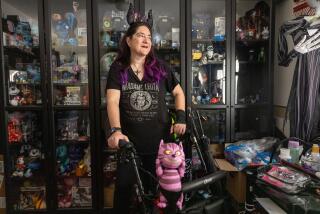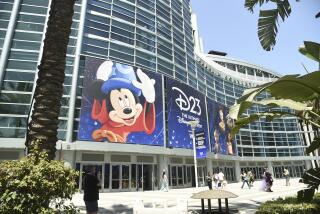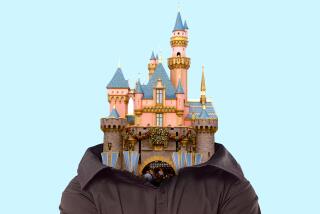Opinion: Disney rides thrill me as a wheelchair user. But park changes for disabled visitors ruin the fun

As a wheelchair user, I love roller coasters. They give me the freedom that I imagine the able-bodied world takes for granted. When I’m flying through Space Mountain in Disney’s Tomorrowland, I feel liberated. The adrenaline has both a physiological and psychological effect on me. It gives me a respite from the spasticity in my right arm that accompanies my cerebral palsy. And it makes me feel like I am invincible.
Over the last few years, I’ve lost some of my enthusiasm for Disneyland and Disney World after the company modified how it accommodates visitors with disabilities in 2013. The new “Disability Access Service” program does not allow us and our guests to skip the line. It works like a traditional FastPass, requiring us to make an appointment to return at a scheduled time.
This involves waiting. I can handle longer waits, so this still works for me. The same cannot be said for people with cognitive disabilities, who can experience traumatic meltdowns upon being forced to wait.
More than two dozen parents of children with developmental disabilities have filed suit against Walt Disney Parks and Resorts, charging that the modified disability access policy violates the Americans with Disabilities Act. One of those cases, involving a guest with autism, is set to go to trial in February in Florida. A similar suit is scheduled to be heard in California the following month.
Disney told The Times the new policy complies with all ADA requirements. “Disney Parks have an unwavering commitment to providing an inclusive and accessible environment for all our guests,” the company said in a statement.
The people represented in the lawsuits and I have different disabilities, and the theme parks have, of course, played different roles in our lives. Yet Disney’s magical worlds have probably become as inextricable to their identities as they are to mine. The parks are among the very few places where it’s possible for us to feel unconstrained in a world that is not designed for our bodies.
During my senior year of high school, Space Mountain served as the launch site for me — a socially isolated teenager — to emerge from my shell while at Disney World’s Grad Night in 2008.
Back then, Disney offered guests with disabilities unlimited access to alternative entrances. The access typically shortened my wait time from what could be three hours to 15 to 20 minutes. I used the unlimited access as an incentive to create a posse that included my caregiver Kevin, my classmate Frank and many of his friends.
But at Space Mountain, there was a hitch. That ride’s priority-access line had been moved to one that required traversing steps. When I informed my friends we would have to wait in an hourlong wheelchair-accessible line, they would not have it. Four of them carried me, each holding one of my arms and legs, while another group disassembled and lifted my wheelchair in pieces.
I felt like I was bodysurfing at a rock concert as my classmates cheered us on. When the line became too narrow for them to carry me, I insisted that they let me down and hold my arms so I could walk the rest of the way. Cerebral palsy limits my ability to walk long distances, but my excitement in the moment propelled me to make it to the boarding area.
Should Disney have had a more accessible priority-access line that night? Definitely. But in that moment, being mad at Disney was the furthest thing from my mind. Grad Night did something for me I never would have expected.
It rocketed me into a world of social acceptance I had never experienced. I connected with a group of people who saw my need for assistance as an opportunity to come together and have fun. Lifelong friendships were formed, and I learned the value of relying on people other than my family or paid caregivers for help. That night, Tomorrowland lived up to its promise of a future where anything seems possible.
But knowing that visitors now have to struggle with waiting to go on a ride at the Disney parks has taken the sheen off of one of my favorite places. What is at stake for people with autism is not simply the chance to get on rides faster. It is their right to live in a world where they can have a good time just like anyone else.
The more I learn about the lawsuits against the parks, the more I lose my sense of what Disney once meant to me.
I still have great affection for Disney, but a Disney park will never again be the special place it was to me on Grad Night. I am skeptical of Disney’s commitment to provide a magical experience for all guests, regardless of ability. No one should have to go to court to be able to enjoy “The Happiest Place on Earth.”
Kevin T. Mintz is a disability rights scholar and activist.
More to Read
A cure for the common opinion
Get thought-provoking perspectives with our weekly newsletter.
You may occasionally receive promotional content from the Los Angeles Times.










